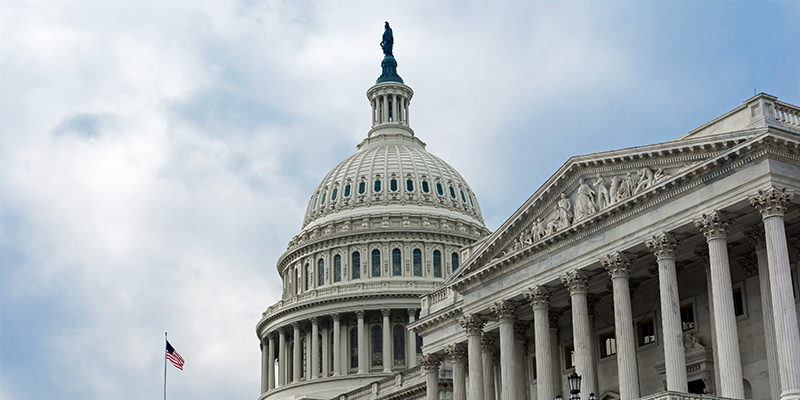redux: Latin, (from the verb reducere, meaning “to lead back”) can mean “brought back” or “bringing back.”
A few weeks ago, Democratic hopes for a big bill that would enact President Joe Biden’s climate change agenda, among other things, seemed all but dead. West Virginia Senator Joe Manchin (D-WV) had publicly announced that recent inflation figures would prevent him from voting for anything but a very slimmed down version of a budget reconciliation bill. Media reports describing it as a “crushing blow” were numerous. Even the White House seemed to acknowledge as much, saying Biden would support a bill extending health care subsidies and providing that Medicare could negotiate prescription drug prices.
But to paraphrase the old saying, reports of the reconciliation bill’s death had been greatly exaggerated. After months of on-and-off negotiations, and with little more than a week before the Senate was scheduled to leave for an August recess, Senate Majority Leader Chuck Schumer (D-NY) and Manchin announced an agreement on a $740 billion budget reconciliation bill, surprising Democrats and Republicans alike.
The Inflation Reduction Act of 2022 would spend $369 billion on provisions to address climate change and enhance energy security, extend provisions of the Affordable Care Act, enable Medicare to negotiate drug prices, and increase taxes on businesses by $327 billion, according to a summary of the bill. Of importance to NAIOP’s members is inclusion in the bill of a provision affecting carried interest compensation, or “promotes.” This provision would raise $14 billion in taxes by increasing the current holding period needed to receive capital gains treatment from three to five years. However, unlike past versions of carried interest legislation, this bill also contains a specific exception for real property trades or businesses that would keep the holding period at three years.
While inclusion of a specific exception for real estate businesses is certainly a positive change, the language of the provision unfortunately makes substantive and problematic changes to the treatment of carried interests. Specifically:
- Holding Period Start Date: The stated holding period of three years could in fact become a longer, extended period of time beyond the three or even five years, under certain circumstances. This is because the holding period under the bill would start when a partnership acquires “substantially all” of its assets. But real estate partnerships and real estate funds are not necessarily static, and in fact are often adding to their real estate assets. As a result, if the holding period has to restart, a real estate business may never meet the “substantially all” requirement.
- Applies to Section 1231 Gains: The provision extends the three-year holding period requirement to IRS Section 1231 gains – the net gain from property that is used in a trade or business or held for the production of income. This was excluded from the carried interest changes enacted in 2017 that established the three-year holding period. The impact could, for example, be felt by real estate funds that build housing and need to sell assets before the three-year holding period is concluded to finance additional projects.
- Retroactive Application: Although the bill provides that the changes to the tax treatment of carried interest would apply after Dec. 31, 2022, in fact the provision would apply to partnership agreements executed years before the enactment of this bill. This would impact the basic agreements reached by the partners regarding specific deals and their underlying economics, and the relative compensation due to each partner under those agreements.
In order to pass the Senate, the reconciliation bill will need the support of all 50 Senators in the Democratic caucus. Arizona Senator Kyrsten Sinema, a former member of the Green Party, has been vocal in her opposition to changes in the taxation of carried interests in the past, but has declined to comment on how she would vote on this bill containing $369 billion in climate change and energy security provisions. Although Schumer’s stated intent is to bring this bill to a floor vote before the Senate leaves for its August recess on Aug. 5, that timeline may not be realistic. Because this is a budget reconciliation bill that is governed by very specific Senate rules, the Senate parliamentarian must clear all language. That involves meeting with both Republican and Democratic Senate staff to hear arguments on whether specific provisions comply with the Senate’s reconciliation rules. After that, 20 hours of debate begins, followed by a period of voting on amendments known as a “vote-a-rama” because of the large number of amendments expected. This will probably move consideration of the legislation well into the weekend and possibly into next week.
Since the Manchin-Schumer announcement, NAIOP and its government affairs team have been at work with our real estate allies to ensure that policymakers, including Sinema, understand the shortcomings of the carried interest provision and its impact upon real estate entrepreneurship and investment. The reconciliation debate may conclude more quickly than anticipated if Sinema gives her approval, or it could extend until mid-August or beyond. Regardless of the ultimate timing, we will continue to advocate for the commercial real estate industry and NAIOP’s members as the reconciliation bill moves forward.














